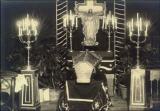obituary - more
The photograph shows the coffin containing the mortal remains of Fr. Dehon, on the catafalque of the chapel in Brussels.
When Fr. Dehon dies on August 12, 1925 many people and institutions sent messages of condolences to the Congregation of the Priests of the Sacred Heart. Many newspapers (especially French, Italian, Belgian and Dutch) announce the Founders' death and often publish a short biography. Among these the article of George Goyau in 'La Libre Belgique' on November 9, 1925 deserves special attention.
First of all this attention to Dehon’s death is evoked by the personality of Goyau (1869-1939), one of the most eminent figures of French Catholicism at this time. Goyau, a historian, becomes after Rerum Novarum 1891 one of the most staunch defenders of the Ralliement and of social Catholicism. But his masterpiece is the Histoire religieuse de la France (1922), which makes of him one of the most esteemed catholic scholars.
Several times Goyau meets Fr. Dehon, especially in the 90s in Val-des-Bois and in Rome.
It is in the interpretation of the '90s with Val-des-Bois as a symbol, where Goyau shows a comprehension of Dehon which goes perhaps well beyond what the majority of Dehon's own confreres discovered in their Founder.
"The successive periods in Fr. Dehons' life, his social period and his mystical period, seemed to unify, to merge, in the summer sessions he liked to make in Val-des-Bois. It was here, next to workers, next to a Christian employer as Harmel, that the thinking of Fr. Dehon slowly matured the idea of the 'Christian Social Handbook', which... directed many young aspirations on their ways of social action. I still hear Fr. Dehon, at that time in Val-des-Bois, when he develops in front of young clerks and young lay people the pontifical teaching and deduces the lessons emerging for their energies.
A proud silhouette he was, and rigorous was his theology; but immediately, as soon as he began to speak, a tenderness of the heart appeared on his lips, which was nourished in his daily meditations by the constant contemplation of another tenderness, the tenderness of the God-man. As a social apostle, too, he was first of all the disciple of the heart which had had pity"
(La Libre Belgique, 9.11.1925, AD Inv-Nr. 0068406)
